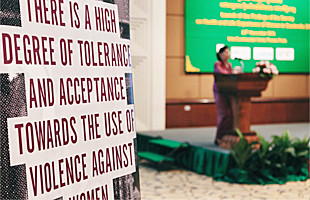Women in Cambodia continue to face violence, U.N. report says
Date:
Author: Mariken Harbitz
Phnom Penh, Cambodia – One in five women in Cambodia has experienced sexual and/or physical intimate partner violence, according to the newly released National Survey on Women’s Health and Life Experiences conducted by the National Institute of Statistics of the Ministry of Planning and the Ministry of Women’s Affairs, supported by UN Women and WHO, and funded by the Australian Government.

“The study findings confirm that violence against women is one of the most pervasive human rights violations in Cambodia” said UN Women Country Representative, Wenny Kusuma. “Due to shame and social stigma, most victims never tell others of the violence they have experienced, and very few seek assistance. This underscores the urgency of ensuring that a full range of services are available and that all victims are fully aware of their right to access these services,” added Kusuma.
“Violence against women and girls is an important public health issue in Cambodia. It results in serious health consequences for survivors," said WHO Representative in Cambodia, Dr Dong-il Ahn. "This study also confirms the link between gender inequality and violence. The health sector has an important role to play in responding to survivors' needs" he added.
“We hope that the information presented in this report will strengthen Cambodia's efforts to effectively prevent and respond to violence against women and improve services for all Cambodians, especially women who experience violence” said Her Excellency Dr Ing Kantha Phavi, Minister of Women’s Affairs.
The survey offers evidence on the significant physical, mental, sexual and reproductive health consequences for women survivors of violence, including injuries and pain, suicide and miscarriage. It shows that 90% of women who reported being injured by their intimate partner, had been hurt severely enough to need health care. However, 47% never sought health care.
The study, conducted in 2014–2015, collected information from a total of 3574 women between 15 and 64 years from across Cambodia who participated in face-to-face interviews. Adapting a globally recognized WHO methodology to the Cambodian context, the study asked women about their experience of different forms of intimate partner violence as well as physical and sexual violence by non-partners, health-related consequences, risk and protective factors and women’s coping strategies.
The data generated by the study is expected to fill a gap in evidence and provide a strong basis for developing an effective response to gender-based violence in Cambodia.